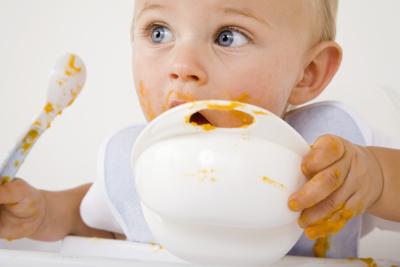Feeding your baby for the first time is exciting. Many parents even record the event for posterity. For some mothers, the anticipation quickly turns to worry about whether the baby is getting enough nutrients. It’s sometimes difficult to know just what and how much your baby should eat. Luckily, a balanced diet for babies is not that much different from a balanced diet for adults. The portions are just a lot smaller.
Time Frame
Breast milk is the perfect food for infants, according to the National Women’s Health Information Center. Rich in nutrients, antibodies and calories, this convenient food also has benefits for the mother. These benefits include a lower risk of developing breast cancer or diabetes. Breast milk should be your baby’s only food until he is around 6 months old, although you should continue to breastfeed until he is 1 year old. If you can’t breastfeed, your baby should be fed formula until he is around 5 or 6 months old. At that point, you can begin to give your baby cereals mixed with breast milk or formula. Juice can be introduced at 6 months also. Gradually introduce him to strained fruits and vegetables as his first year progresses. When he develops teeth, you can start giving him soft foods to chew on.
Features
Babies vary widely in their caloric needs based on their weight. On average, babies need around 900 calories per day, according to the American Heart Association, with between 30 to 40 percent of that coming from fat. That amount can vary by as much as 200 calories for babies who are very active.
Types
By the time a baby is 12 months old, she should be consuming about 2 cups of dairy products per day. This can include yogurt, cheese and milk, but do not give a baby cow’s milk until she is 12 months or older. She should also consume about 3 oz. of grains per day, with half of that being whole grains. Try feeding her some whole grain cereal or bread. One slice equals 1 oz. Grains can also come in the form of pasta or rice. In addition, your baby needs 2 oz. of meat per day. Beans can fulfill this requirement, and one egg equals 1 oz of meat. Turkey, chicken and white fish are all good choices as well. Finally, make sure your 1-year-old baby eats 1 cup of fruit (which can be a whole apple or banana), and 1 cup of vegetables each day.
Considerations
Babies go through eating cycles. If your baby hits a growth spurt, you may notice his appetite dramatically increasing. Or, there may be a time when he doesn’t seem to be interested in eating at all. This is perfectly normal and is usually not anything to worry about. Continue to give him a wide variety of healthy choices, and he will probably return to his normal eating habits within a day or two.
Warning
Some foods are not good for babies. Honey can cause botulism and should not be given to children under 1 year of age. Whole milk should not be given to babies because it can cause low blood counts, according to MedlinePlus. Foods that may cause choking, such as grapes or nuts, should be saved until the baby is old enough to chew them up. Avoid foods high in caffeine, sugar and salt. In addition, watch your baby carefully when you first introduce her to high allergen foods, such as strawberries and peanut butter. If she develops a rash or other allergy symptoms, wait a few months and try again later.





